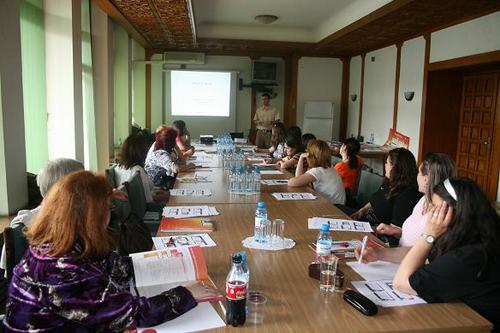Bulgaria

Bulgaria - Project Work Seminar
The Macmillan seminar in Bulgaria took place at the Rila Hotel in the heart of the city of Sofia.June 12th, 2008
One of the colleagues commented that the hotel was a favourite with the party elite once upon a time and that we may have been working in a room that once hosted the likes of Todor Zhivkov. We had our own balcony over central Sofia.
![/userfiles/files/BG-Projects1.jpg [/userfiles/files/BG-Projects1.jpg]](/userfiles/files/BG-Projects1.jpg)
There were 22 participants, which was a great turnout considering that we had to change the venue at the last minute. This happened because of a ‘routine maintenance’ to the electricity supply in the area of town where the first venue had been planned. It was also a stormy, cloudy, rainy day, but come they did.
Dan gets us started
The topic of the workshop was ‘Projects’. This has been a regular request from colleagues on the feedback forms of other workshops and as it’s also an area I’m particularly interested in, we put together a 3-hour programme for colleagues on this topic.
It’s a topic which is very diverse, but we focused on four main areas. We looked at what to do, meaning what topics are there which make good areas for project work. We looked at what programmes there are to support teachers carrying out project work. We discussed creating school links as part of project work. We also looked at how colleagues could create audience for their students’ work, by making use of the various tools and instruments available via the internet.
the Projects PPT handout is available here below
Science Across the World is probably the most well known programme of projects for teachers around the world with its bank of ready-made resources of 16 topics and database of contact teachers and schools now numbering over 6500.
I gave a brief introduction to the programme.
It’s important to point out to colleagues that the registration for the programme at the moment is free. Normally 20GBP, the fee is wavered while a new corporate sponsor is found.
From experience I know that the best way to get teachers familiar with the Science Across the World programme is to get them to try out some of the tasks and activities in the topics.
The newest topic is ‘All under one sky’ which among other things covers areas related to the solar system and has students create paper rockets.
The rocket factory
![/userfiles/files/BG-Projects8.jpg [/userfiles/files/BG-Projects8.jpg]](/userfiles/files/BG-Projects8.jpg)
Launching rockets at the Science museum, Berlin
We looked at Keeping Healthy.
In Keeping Healthy one area covered is data concerning fatalities from accidents in young people in Europe and the proportion of this which is caused by road accidents.
As I’d just taught this particular area and mixed it with materials and activities on road safety in my own school, the EDS Plovdiv, I got the participants to discuss road accidents in Bulgaria and carry out the speed reaction test.
I like a lot of the topics and materials in Science Across, but one of my particular favourites is ‘Biodiversity Around Us’. Next year will see the world celebrate the year of Darwin and the bicentenary of his birthday on Feb 12th.
One of the tasks in Biodiversity is mapping an area of biodiversity for exchange. The participants looked at a number of samples of maps from schools around the world and then had the task to create their own BioMap of Bulgaria. There were some wonderful creations.
This topic is particularly significant for many reasons, but Bulgaria has suffered a tragic decrease in the numbers of the Imperial Eagle and Saker Falcon (www.rspb.org.uk).
creating biodiversity maps on Bulgaria
In a workshop that looks at Science Across we had to include Talking about Genetics and the topic of heredity and variation which is a great topic for language work in the classroom.
The colleagues surveyed the variation in the group for hair and eye colour, height, tongue rolling, mid finger hair, ear lobes, and skin colour.
Amazingly, 50% of the group could roll their tongue. In other groups it’s always been around 85%!
We also looked at What Did You Eat? This is a topic I first did with own students and I used this particular topic to discuss ways of presenting classroom research data.
It makes sense to pay some thought to presentation because partners involved in school curriculum exchange work won’t be very excited at pages and pages of text and numbers. My class chose to present their work in the form of a news letter on Eating Habits. You can download the project report from here below.
After all this hands-on work, we asked for a guinea pig in the group to sign up to the programme so that everyone could see how the process works live on the science across site.
Finding partners
Factworld has around 2400 members in its egroup. The flags page on the website is becoming more populated every year (www.factworld.info). We talked about where teachers could go to find partners to work with on their potential projects. FACTWORLD is a great place to look. We also discussed ‘school links’. There are a good many places to look for potential partners. You can start with FACTWorld!
Finally, we discussed how to publish student work on the internet.
Here are a number of ideas.
You can download the complete document at a link below.
It was a great group to close the school year with and they were all warmly invited back in the autumn. Dan and I are discussing new topics for future Macmillan workshops. ICT in the classroom has been on the request sheet a number of times, we’ll see what we can do.